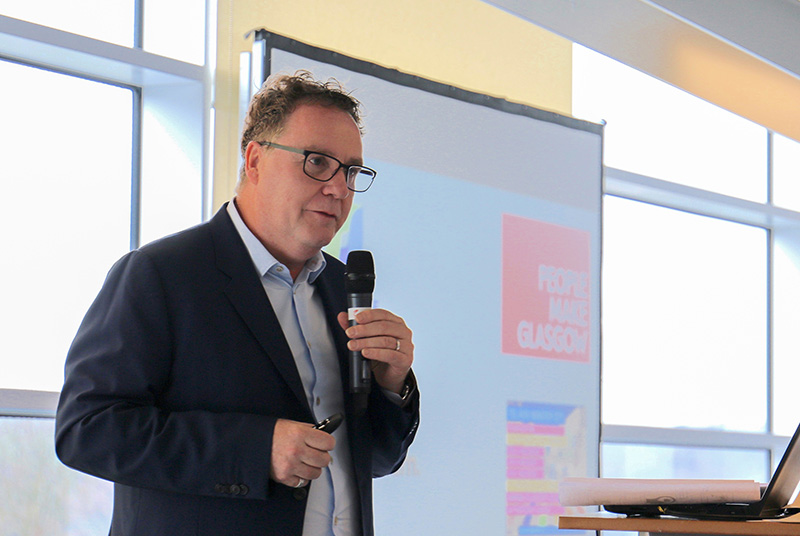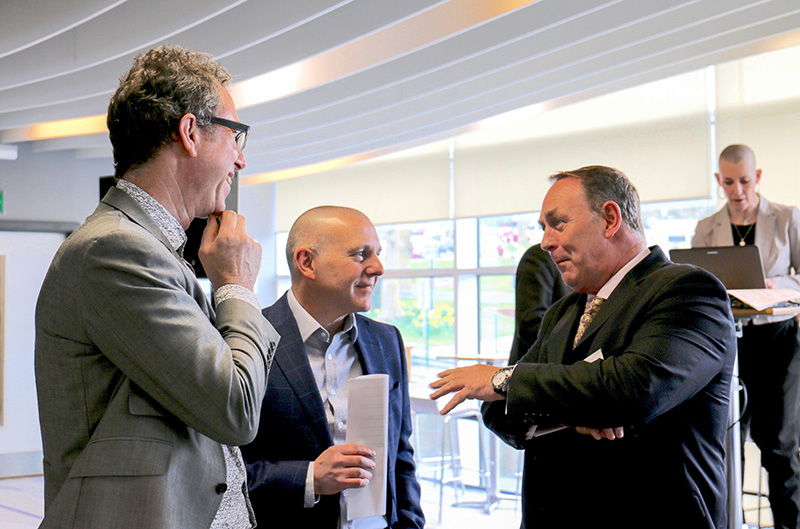Photo: Chairman of Greater Brighton Cllr Garry Wall (centre) answering questions on the panel alongside Vicki Hughes, Fugu PR Managing Director, and Paul Barber, Brighton & Hove Albion CEO
Greater Brighton is well placed to join other regions around the world as a thriving centre of innovation and growth, says an expert who has advised 100 cities around the globe.
Greg Clark, a leading urbanist, said many of the ingredients Greater Brighton needed were probably already in the DNA of the region but still needed to be identified and their story told in a compelling way.
“You have a diverse population with a willingness and appetite to embrace life. There is also a high level of civic activism which means the region is already in a good position to demonstrate how to meet sustainably some of the complex challenges ahead,” said Professor Clark, CBE, speaking at ‘Futureproofing the City Region: Civic Innovation and the Transformation Economy,’ at Brighton’s Amex stadium on Thursday.
The forum, organised by the Greater Brighton Economic Board (GBEB) and Brighton-based, the IMEX Group, brought together local businesses, politicians and representatives from local universities to discuss how to develop the identity of the Greater Brighton region. The region which stretches from Crawley and Gatwick Airport in the north to Seaford in the east and Worthing in the west. It is set to be joined by Arun District Council, with towns such as Arundel, Littlehampton and Bognor, soon.
Prof. Clark said it was important to come to a common understanding of the region’s narrative and, once established, tell it in a simple and coherent way so that citizens see they are part of it and become champions of it. Citizens, he said, were often the drivers of innovation and change along with the private sector. “Getting the narrative right is what allows investment to flow,” he said.
He added that Greater Brighton was uniquely placed to be a world leader in the four economic models which cities of the future will need to embrace: the circular economy which stresses waste reduction and energy conservation, the sharing economy in an age of wanting to own less and share more, the experience economy which is about experiences, for example watching world class football, and the innovative economy which the region already had.
The region also had high quality universities which had a role to play in encouraging students to stay in the region, along with the need to address the brain drain of workers to London by showing them how the local economy is changing.
Prof Clark supports and guides metropolitan strategies world-wide as Professor of City Leadership at University College London and a strategic advisor for the Organisation for Economic Cooperation and Development’s Local Economy Programme. He has advised on governance reform in Auckland, Sydney, Rio de Janeiro, Vienna, London, Toronto, Barcelona, Sao Paulo, Milan, and Oslo. He has led 25 reviews of city and regional development for the OECD.
Cllr Garry Wall, chairman of Greater Brighton confirmed the need to keep talent in the region and for partnerships between business, politicians and education. “Our message about Greater Brighton being open for business has to be loud and clear. To attract investment we need to be punching above our weight and grow through quality and innovation,” he said.
Nick Hibberd, Executive Director of Economy, Environment & Culture at Brighton & Hove City Council said that it was also important to move from being one of the UK’s start-up capitals to a scale-up city region where companies combine a solid technological edge with a clear focus on becoming leaders in their fields.
The CEO and deputy chairman of Brighton & Hove Albion Football Club, Paul Barber, also said the clear vision, persistence and resilience needed to build the Amex stadium would also be needed to grow the region. He said the football club was now the single biggest promotional tool for the city of Brighton with its matches frequently broadcast to 200 cities around the world.

Photo: Keynote speaker Professor Greg Clark at the Greater Brighton conference

Photo: Chairman of Greater Brighton Cllr Garry Wall in conversation with Paul Barber, Brighton & Hove Albion CEO, and Geoff Raw, Brighton & Hove City Council Chief Executive
